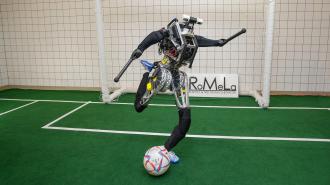In July 2023, roboticists from UCLA will take a one-of-a-kind humanoid robot to France — to see if it can beat other bots at soccer.
The RoboCup: The upcoming soccer match is the main event at the RoboCup, an annual gathering where teams from around the globe demonstrate their advanced robots and AIs through a series of competitions.
This year’s RoboCup will take place in Bordeaux, France, from July 4-10, and more than 100 teams from 45 countries are signed up to see their robots compete at soccer and challenges in three other categories: Rescue, @Home, and Industry.
Soccer robot: Teams from the Robotics and Mechanisms Laboratory at UCLA (RoMeLa) have been competing in the RoboCup’s soccer tournament for years — they’ve won their division in the tournament five times with previous soccer robots, last taking home the trophy in 2015.
They think they have a good shot of bringing home another world championship in the adult-size humanoid league this year with ARTEMIS (“Advanced Robotic Technology for Enhanced Mobility and Improved Stability” or “A Robot That Exceeds Messi In Soccer”).
The major innovation with this soccer robot, which is 4.6 feet tall and weighs 85 pounds, is its custom actuators, which are designed to behave like actual muscles.
“That is the key behind its excellent balance while walking on uneven terrain and its ability to run — getting both feet off the ground while in motion,” said Dennis Hong, director of RoMeLa. “This is a first-of-its-kind robot.”
The tournament: The soccer matches at RoboCup are divided into leagues based on the robots’ size and design, and ARTEMIS qualifies for the adult-size humanoid league.
In that league, teams have two autonomous robots on the pitch, with one of them playing goalkeeper. Once each team plays against every other team, the robots are ranked based on wins, numbers of goals scored, and other metrics to determine who advances to the next round.
The robots are allowed to communicate wirelessly with their robot teammates, but they cannot receive instructions or information from human handlers during the match (though a handler can stand behind each soccer robot to catch it if it seems poised to fall).
Money matters: Unfortunately, ARTEMIS might not get a chance to participate in the tournament — the team at UCLA is still trying to raise the funds needed to build a teammate for their soccer robot.
“RoboCup is a team sport, and building and competing with two ARTEMIS units requires significant resources and funding,” they write on a page asking for donations. “We are reaching out to the community to ask for your support in helping us achieve our goal.”
If they can’t raise the funds, ARTEMIS could still participate in the drop-in tournament in which solo humanoid bots are grouped together or in the technical challenges — those test the robots’ balance, mobility, and ability to kick.
“RoboCup really brings the research community forward.”
Stefan Kohlbrecher
The big picture: While watching robots compete in a soccer tournament is highly amusing (particularly when things go wrong), the purpose of the RoboCup isn’t just entertainment — it’s to advance the field of robotics.
“RoboCup really brings the research community forward because competitions really bring out the motivation in people — people stay up forever and work on these things — and this really is very also fruitful for cooperation because everybody is in the same place,” said roboticist and Robocup participant Stefan Kohlbrecher.
We’d love to hear from you! If you have a comment about this article or if you have a tip for a future Freethink story, please email us at tips@freethink.com.
